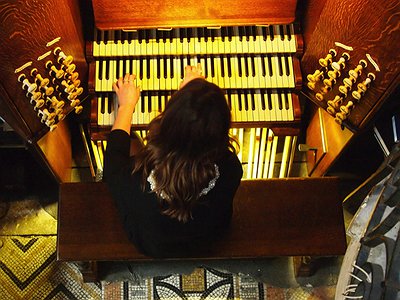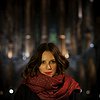Could you take us through a day in your life, from a possible morning routine through to your work? Do you have a fixed schedule? How do music and other aspects of your life feed back into each other - do you separate them or instead try to make them blend seamlessly?
I juggle a lot in a week so there isn’t a typical day. I am music director of the organ at Union Chapel and as well as looking after the organ I also programme all the organ events and education there. Most recently I started an annual experimental organ festival called Organ Reframed, which has grown arms and legs since it began in 2016. There aren’t many contemporary composers writing for the organ. Access can be tricky as most organs are in churches and in order to really explore and write innovative music you need time. The main aim of Organ Reframed is to commission artists and composers to write new works, to allow them time on the organ to develop ideas and ultimately help develop the organ repertoire and show that this is an instrument that is very much at the forefront of new music today.
My week is always very fluid depending on what is happening at the chapel and what compositional project I am working on. Typically I try to keep the Chapel work down to two days a week and the rest of the time is spent writing or rehearsing if I am preparing for upcoming shows. My rehearsing mainly takes place at the Chapel on the organ and also if I am writing for organ. If I am playing an organ show elsewhere I have to travel there to rehearse. Every organ is different and because I play with wind pressure I need to spend a lot of time with the organ before I perform live. Towards the end of a project I’m in the studio editing and mixing, so it really is quite varied. It’s definitely an art trying to balance everything but I do feel that it all very much feeds into each other.
Could you describe your creative process on the basis of a piece or album that's particularly dear to you, please? Where did the ideas come from, how were they transformed in your mind, what did you start with and how do you refine these beginnings into the finished work of art?
I was recently commissioned by Oude Kerk in Amsterdam to write a new piece for their Ahered and Bunzema organ. Fairge explores the precise control of wind through the pipes using mechanical stop action. This creates a harmonic backdrop against the additional harmonics and melody, which I play on my cello.
Oude Kerk were very generous in letting me have time to explore and really get to know the instrument. The work was developed over many visits sitting in the church until the very wee hours over the winter months, which was incredibly magical and inspiring. When working with mechanical stops and precisely controlling the amount of air that passes through the pipes it requires a lot of practice and exploration to learn each incremental sound the organ can make and what the quirks of the instrument can be. As every organ is unique, the piece will differ on other organs but that’s what makes writing and working with the organ so fascinating. The tuning is mean-tone temperament, which I have not worked with previously. With Fairge I really wanted to show how special this relatively small organ is and the beautiful pallet of sound it can produce. The space is also very much a part of the instrument and you are effectively also playing the room. It was really exciting experimenting with the acoustics of Oude Kerk and creating a site-specific piece for such a beautiful space.
I wrote the piece for their Silence concert series and performed it in February this year. As I can’t play cello at the same time once I was happy with the organ part I took a rough recording so I could then add the cello parts in my studio. The live performance featured the pre-recorded cello part being played over a multi-channel system whilst I played the organ. This was all synced by following a stopwatch. I then re-visited the organ in June and recorded the organ properly and it was released in October 2017.
There are many descriptions of the ideal state of mind for being creative. What is it like for you? What supports this ideal state of mind and what are distractions? Are there strategies to enter into this state more easily?
I have a couple of specific spaces dedicated to being creative (my studio, at an organ console or with my cello). Entering these spaces definitely shifts my concentration into creative mode but it’s definitely not black and white. Often I will be working all day on a piece and nothing is working and then when I leave and I’m walking down the street or I’m cooking etc. suddenly it all comes and I’m humming into my phone to capture it before I forget. When I’m deep into writing a piece no matter where I am it’s always swimming around in my head and I often can’t sleep. Once I’ve started a piece my brain is always buzzing and I find it hard to switch it off.
With regards to distractions one key thing, no internet or phone! I also never listen to music when I’m working on a piece I find this to be hugely distracting.
How is playing live and writing music in the studio connected? What do you achieve and draw from each experience personally? How do you see the relationship between improvisation and composition in this regard?
As I write on my cello and at the organ writing material and performing it live is very much connected. For cello I usually multi track record in Pro Tools and then I have to figure out the best way to realise the piece in a live performance but with my organ pieces the way I write and record them is essentially capturing a live performance.
Improvising is hugely important in my writing process. All of my pieces, whether on organ or cello, come from me sitting and improvising on the instrument and through this process I capture the parts l like (whether writing it down or recording it) and over time it becomes a set scored piece.
How do you see the relationship between the 'sound' aspects of music and the 'composition' aspects? How do you work with sound and timbre to meet certain production ideas and in which way can certain sounds already take on compositional qualities?
When writing for an instrument I very much think of it as a sound source as opposed to an instrument with written rules in technique etc. For me it’s about finding the unique sounds of the instrument and exposing that beauty.
Having come from an electronic compositional background what I find so exciting is that you can create sounds on the organ that sound like you are using electronics but it’s completely acoustic. So for example in my organ work The Molendinar I experiment a lot with the mechanical stop action. This creates the most beautiful harmonics and overtones, which can be intricately built throughout the piece. I think coming from an electronic background ‘sound’ and ‘composition’ aspects are the same thing, I don’t separate them out.
Our sense of hearing shares intriguing connections to other senses. From your experience, what are some of the most inspiring overlaps between different senses - and what do they tell us about the way our senses work? What happens to sound at its outermost borders?
I think what’s interesting is making choices with regards to senses when performing live. When I’m performing I like there to be minimal light with no visuals so nothing distracts the audience. It can also be interesting in the right space to walk around and see how the sound changes as you walk around. When I attend a concert I prefer to close my eyes when listening even if there is someone on stage as I don’t want to be distracted or informed by the visual. This creates a heightened awareness of sound.
Art can be a purpose in its own right, but it can also directly feed back into everyday life, take on a social and political role and lead to more engagement. Can you describe your approach to art and being an artist?
For me it’s a very personal thing. I create what I feel and what I hear in my head and also what I uncover from experimenting with an instrument for long periods of time and then special things start to happen. It’s about exposing that beauty.
It is remarkable, in a way, that we have arrived in the 21st century with the basic concept of music still intact. Do you have a vision of music, an idea of what music could be beyond its current form?
In my opinion we should embrace the historic repertoire and also help it to grow, both are equally important.



